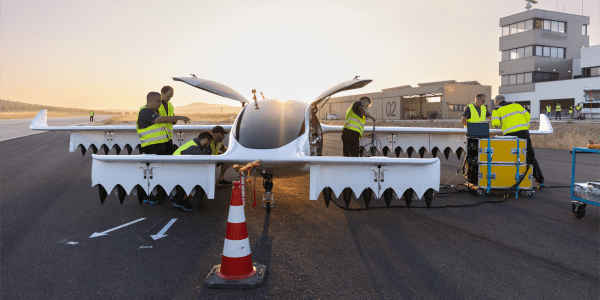
Derek Belch walked away from a dream job as graduate assistant football coach at Stanford University to start his company, Strivr, in 2014. The company aims to revolutionize training of every kind with virtual reality technology.
Today, Strivr helps corporations develop and deliver courses for employees — whether they're athletes, technicians or cashiers — giving them a way to practice critical-work scenarios in a virtual environment.
Strivr has developed learning modules to help workers learn how to keep their factory lines running safely and efficiently, teach employees in big stores or offices what to do in dangerous situations, such as a fire or an active shooter, and learn how to deliver perfect customer service.
More from CNBC Upstart 100:
Lab-grown gelatin is the fake food of the future, one start-up believes
These robots handle dull and dangerous work humans do today — and can create new jobs
How a media upstart that explains the news got Ryan Seacrest and Jimmy Iovine to invest
Why VR? Belch said, "Videos, PowerPoints, lectures, manuals — they don't present information effectively enough to drive learning, retention and behavior change, and they're boring! VR affords the end user a learn-by-doing experience that is scientifically proven to be more effective than traditional, 2-D methods."
For Belch the decision to leave his coaching career behind wasn't easy. He says his mentor, Stanford's head football coach, David Shaw, convinced him to go entrepreneurial and even invested in Strivr to help get the start-up off the ground.
"That David believed in this idea, and in me, was all I needed to hear to take the leap," the Strivr CEO says today.
Strivr landed on CNBC's 2018 Upstart 100 list after inking a big deal last month with Walmart. It also has signed deals to bring 3-D immersive learning to employees at BMW, JetBlue, Fidelity, the NFL, Tyson Foods and others.
Walmart will use Strivr's virtual reality learning modules on Oculus devices to train employees who work in their 4,700 U.S. stores. (The VR courses will be offered to associates who are not able to attend Walmart Academies for in-person instruction.)
Strivr modules can help retail employees get a feeling for a store's layout well before their first day on the job, among other things.
The company has raised $21 million in venture funding to date from investors, including BMW iVentures, the NFL's strategic investment fund, Great Point Ventures and Signia Venture Partners.
Zaw Thet, an early Strivr investor and partner with Signia, notes: "Virtual reality has been up and down the hype cycle a few times. The time when every household has some form of VR headset is coming, but as we all know, it has taken a while and may take a while longer. The beauty of Strivr is that they aren't dependent on widespread consumer adoption of VR headsets. With just 17,000 headsets, Strivr will train more than 1 million Walmart employees at the stores they work in."






